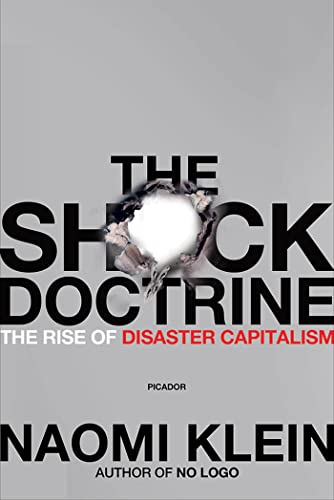The Shock Doctrine
The Rise of Disaster Capitalism
Naomi Klein
BOOK REVIEW

The world trembles upon the precipice of chaos, and in the throes of that calamity, opportunity emerges for those who dare to seize it. In The Shock Doctrine: The Rise of Disaster Capitalism, Naomi Klein masterfully unveils a grim yet enlightening revelation about how governments and corporations exploit crises to implement radical free-market policies that would typically face severe resistance in a more stable environment. This staggering 720-page exploration is not merely a book; it's a jolt to the conscience, an exposé of a doctrine that thrives on disaster.
From the very first page, Klein tackles the phenomenon that she coins "disaster capitalism." The core argument rests on the assertion that in the wake of disasters-whether natural catastrophes, economic meltdowns, or wars-there exists a predatory system eager to exploit the fear and disorientation of the populace. It's a chilling audit of how such dark forces reshape societies, dismantle public goods, and promote privatization under the guise of necessity. Klein's incisive style and rigorous research draw readers into a damning history that spans continents and cultures, revealing a pattern of opportunism that feels both infuriating and unsettlingly familiar.
Picture post-Katrina New Orleans or the 2008 financial crisis, and you'll start to see the threads Klein meticulously weaves through her narrative. She illuminates how these events, rather than being merely tragic, were leveraged to dismantle social supports and install neoliberal agendas. In a deft blend of journalism and academic analysis, Klein transports you through a gallery of suffering and resilience, all while positioning the reader to recognize their own complicity in this cycle. Have we all, to some extent, been seduced by the sirens of economic rationality, willing to sacrifice the greater good for fleeting gains?
Critics of Klein's work often label it alarmist, even conspiratorial. Some claim she overgeneralizes, stretching her argument to fit a worldview that perceives capitalism as an unyielding enemy. However, these criticisms often fall short of addressing the urgency of her message. The consequences of ignoring this doctrine are not abstract; they manifest in real, lived experiences of individuals forced to bear the brunt of privatization and deregulation. Readers from various backgrounds resonate with her warnings-activists, economists, and everyday citizens alike find themselves compelled to confront the slippery slopes of apathy and complacency.
The emotional weight within Klein's prose is palpable. Through her vivid storytelling, you encounter real people-mothers, workers, communities-who have faced the fallout of disaster capitalism. You feel their anger, their despair, and their resilience. Klein doesn't just present facts; she evokes an emotional response that lingers long after you close the book. Her narratives compel you to reflect on the broader implications of economic policies that prioritize profit over people.
As we navigate the complexities of modern society, armed with political turbulence, climate emergencies, and economic instability, The Shock Doctrine serves as a clarion call to awaken from complacency. Klein's work urges us to resist the allure of quick fixes and the convenient narratives crafted by those in power. Instead, she champions collective action and solidarity, nurturing the hope that we can dismantle the very systems that seek to exploit our vulnerabilities.
In the end, reading Naomi Klein's bold testament is more than just acquiring knowledge; it is a call to arms-a demand for awareness in a world where ignorance is not bliss but a ticket to deeper subjugation. If you seek to understand the mechanisms of power and the intricate dance of capitalism amidst calamity, clasp this book tightly; it is a gateway to both anguish and awakening. 🌍✊️
📖 The Shock Doctrine: The Rise of Disaster Capitalism
✍ by Naomi Klein
🧾 720 pages
2008
#shock #doctrine #rise #disaster #capitalism #naomi #klein #NaomiKlein